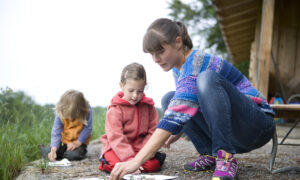5 Pitfalls Homeschoolers May Encounter
Anytime you take on a responsibility as significant as homeschooling, you’re bound to run into some pitfalls. Here are a few common ways homeschooling parents trip themselves up.
Aiming for Perfection
You want only the very best for your children. After making the bold decision to homeschool, you sure aren’t going to mess this up. It has to be perfect.
But wait. Don’t aim for perfection. Aim, instead for connection. Walk this new path alongside your children. There will be bumps and falls all along the way, but you’ll be learning as you go. The fruits of this journey blossom way down the road. They’re incalculable; some are even invisible. Rest assured that you’re heading toward them, though, and that the alternatives can’t begin to compare.
Being Inflexible
For most homeschoolers, it takes a little while to figure out what works best for them. Sometimes, it can take an entire school year, or more, of learning and adjusting methods, resources, schedules, and rhythms.
While it’s great to start out with a plan, that’s probably just a rough draft. Be flexible and observant of what’s working and what’s not, making changes as you go.
Comparing Your Homeschool
You head to Instagram in search of homeschool ideas and inspiration, and a few minutes (or more, ahem) later, you’re beating yourself up for not having a schoolroom that looks like it was designed by Joanna Gaines or for not teaching your 6-year-old Latin or for not establishing a wild and free childhood, homesteading off-the-grid.
The beauty of homeschool is that no two families do it exactly the same way. What’s more, in your own family, you’ll find each season of life and even each school year looks and feels different.
If you’re teaching your children to be good and kind and you can see academic growth over time—you’re knocking it out of the park. Stop comparing and remember #InstagramIsNotRealLife.
Suffering Through
So, you’ve chosen the best curriculum the internet said you needed, and you find yourself dreading every time you need to use it. It may be an effective resource for some, but if you hate it, what do you think the experience is like for your kids?
They say, “If mama ain’t happy, ain’t nobody happy.” We need to double that sentiment for homeschooling mamas (and papas).
Consider the difference when you’re enthusiastic, curious, or even amazed at what’s being learned. Now, you’re on an adventure and homeschooling takes on a magical quality.
Of course, not every subject is going to be accompanied by fireworks. But pay attention when it’s feeling like a slog or drudgery for you. That’s a sign you either need to outsource or shift your approach. Homeschooling’s a marathon, not a sprint, and we need to keep Mama happy for the long haul.
Trying to Duplicate School
It often takes homeschoolers a bit of time and experience to understand the vast differences between school and homeschool. There’s a term for this process—deschooling—which I wrote about recently.
Homeschooling is wonderful, in part, because it allows for long, deep dives into subjects of interest; it offers each individual child a customized pace for learning; it focuses on family traditions and connections and the individuality of each child; and it affords the utmost freedom—where the world is your classroom and the sky’s the limit.
School is the opposite—subjects are confined to periods and interrupted by bells, curriculum is mass-produced, academics cater to the average, and everything is standardized. School is focused on the collective, inhibits freedom, and caps potential.
While the look, feel, and practices of school may be what’s most familiar to you, know that those trappings have little, if anything, to do with education and learning. Those that make the most of homeschooling set the deeply ingrained notions about “schooling” aside.

